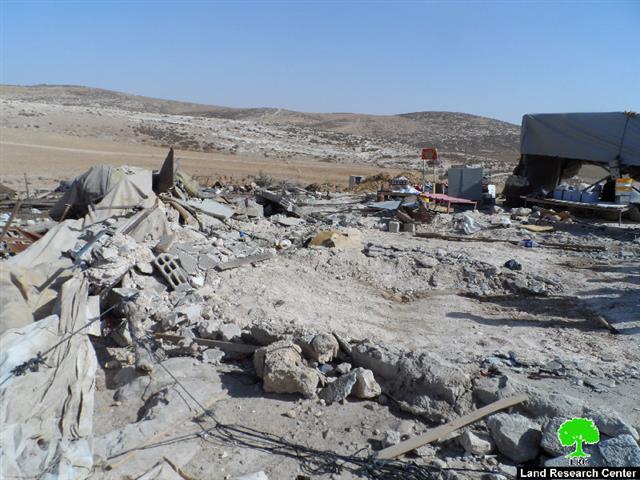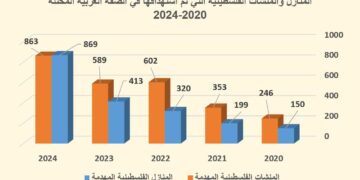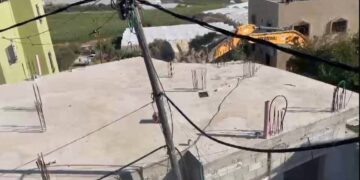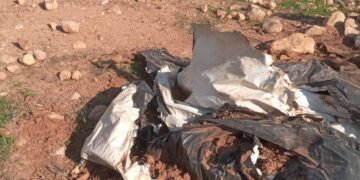Violation: demolition of barns and residences
Location: Khirbet Al-Rahwa- Hebron
Date: August 10, 2015
Perpetrators: Israel Civil Administration and army
Victims: Citizens Rajih and Iyad Samamrih
Details:
The Israeli occupation authorities on August 10, 2015 demolished two residential tents and a sheep barn owned by citizens from Khirbet Al-Rahwa, south Al-Dhahiriya village in Hebron.
Citizen Rajih Samamrih (52) asserted that a force from the Israeli occupation army accompanied by a staff from the Civil Administration and a JCB dozer raided the hamlet, evicted the structures by force and embarked on demolishing them.
Photos 1-6: signs of the structures’ demolition
The dozer reached out Rajih’s tent (established in 2000 with an area of 48m2) that is home for his 12 member family including 10 children and Iyad’s tent( established in 2005 with an area of 30m2), housing his 7 member family including 5 children.
The dozer also moved on to demolish a sheep barn belonging to citizen Rajih; the barn is tent-shaped and is of 100m2. It barn was built twenty years ago and accommodates 120 sheep.
Rajih pointed out that the force cut down the power cables before carrying out the demolition. Noteworthy, the two brothers depend on solar cells gifted by the Applied Research Institute-Jerusalem ARIJ.
The citizen also said that an officer from the Civil Administration rendered a tour in the area on August 06, 2015 and requested some information about the solar cells but showed no intention in demolishing the place.
After the demolition, the two brothers set up tents in the area to shelter their kids. The Red Crescent association also gifted tents for affected people.
Samamerih also pointed out that the occupation served him stop-work orders four years ago; the citizen sought help from the municipality of Al-Dhahiriya but no results were rendered in this regard.
The Israeli occupation authorities carried out several demolition operations in the hamlet. For further information, please read the following reports issued by Land Research Center:
- Demolition of residence and barns in Khirbet Al-Rahwa-Hebron(Ar, Eng)
- Demolition of a fodder storehouse in Khirbet Al-Rahwa-Hebron(Ar, Eng)
- Demolition of residence and barns in Khirbet Al-Rahwa-Hebron(Ar, Eng)
- Demolition of a barn in Khirbet Al-Rahwa-Hebron(Ar, Eng)
- A wave of demolition on Khirbet Al-Rahwa-Hebron(Ar, Eng)
About al-Rahwa:
Al-Rahwa is located south of Al-Dhahiriya and east of Al-Ramadin towns. The hamlet was originally a primitive community for people who fully depended on livestock breeding and winter crops plantation. The area is considered an architectural Roman site with several caves founded there.
The hamlet populates around 50 people; the population becomes 200 in spring for other families move in to graze their herds in the town’s pastures. Noteworthy, Tenih colony overlooks the northern part of al-Rahwa and is 1km away from it. The segregation and separation wall is there from the south as well as to Dhahiriya crossing, which leads to the occupied territories of 1948.
Land Research Center LRC sees that the demolitions contradict with all the International conventions and Humanitarian laws including:
Article 17 of the (1948) Universal Declaration of Human Rights stating: “Everyone has the right to own property alone as well as in association with others. No one shall be arbitrarily deprived of his property.”
Section ‹G› of article 23 of the (1907) The Hague Conventions asserting: “In addition to the prohibitions provided by special Conventions, it is especially forbidden to destroy or seize the enemy's property, unless such destruction or seizure be imperatively demanded by the necessities of war.”
Article 53 of the Geneva Fourth Convention (1948) declaring: “Any destruction by the Occupying Power of real or personal property belonging individually or collectively to private persons, or to the State, or to other public authorities, or to social or cooperative organizations, is prohibited, except where such destruction is rendered absolutely necessary by military operations.”
Section 1, Article 11 of the International Covenant on Economic, Social and Cultural Rights (1966): “The States Parties to the present Covenant recognize the right of everyone to an adequate standard of living for himself and his family, including adequate food, clothing and housing, and to the continuous improvement of living conditions. The States Parties will take appropriate steps to ensure the realization of this right, recognizing to this effect the essential importance of international co-operation based on free consent."
Prepared by
The Land Research Center
LRC


















